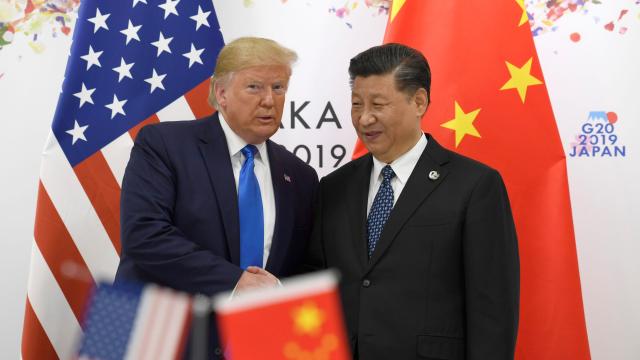Donald Trump and his Chinese counterpart, Xi Jinping, met during the Group of 20 summit in Osaka, Japan and reached a “cease-fire” in the ongoing U.S.-China trade war that will “remove some curbs on Huawei Technologies Co. buying high-tech equipment from the U.S.,” the Wall Street Journal reported.
The U.S. has targeted Huawei, one of the crown jewels of the Chinese tech world and the world’s largest telecom gear supplier, for harsh sanctions amid claims by the intelligence community that its equipment poses a security risk and accusations of trade theft and violations of embargoes on Iran. The Commerce Department has put it on a so-called “entity list,” triggering a countdown to Huawei facing sweeping restrictions on what U.S.-made technology it can purchase without federal approval and threatening to wreck its entire supply chain.
According to the Journal, Trump said the cease-fire declared this weekend will delay imposing greater tariffs on $US300 ($427) billion in Chinese goods that aren’t already subject to 25 per cent tariffs in in exchange for China “buying large amounts of American farm products.” Trump also apparently put Huawei’s status up front on the negotiating table, despite the insistence by some in the administration that the sanctions are not designed to gain leverage in trade talks:
The National Security Council has been examining ways of narrowing the restrictions on Huawei so they focus on sales of U.S. technology used in “chokepoints,” where Huawei technology could control wireless networks, people familiar with the discussions said.
Mr. Trump was clearly making Huawei a part of any trade settlement, although his top advisers, including Treasury Secretary Steven Mnuchin, have said the administration was keeping Huawei separate from trade talks.
“We’re talking about equipment where there’s not a great national-emergency problem with it,” Mr. Trump said.
Prior reporting by the Journal has indicated the Chinese government views Huawei as a top priority, and that it has made clear that lessening the penalties imposed on the company is a precondition for a deal.
Chinese chipmakers have been extremely wary of the entities list, which has had several Chinese companies added to it in recent weeks and could threaten to undermine state production goals. Some U.S. companies have reportedly found ways to ship some products to Huawei without violating the export bans, though exactly what technology could be sold to the company and which was restricted by the entity listing remained somewhat unclear. It’s not clear how the penalties will be further relaxed, with Trump remaining typically vague on the topic in remarks to reporters.
“I said that’s O.K., that we will keep selling that product, these are American companies that make these products. That’s very complex, by the way,” Trump said, according to Bloomberg. “I’ve agreed to allow them to continue to sell that product so that American companies will continue.”
The Journal noted that the decision to pivot on Huawei has already attracted criticism from Democrats and some Republicans in Congress, with Senate Minority Leader Chuck Schumer saying it would “dramatically undercut our ability to change China’s unfair trades practices” and Senator Marco Rubio threatening to “get those restrictions put back in place through legislation.”
It also spurred comparisons to Trump’s handling of ZTE, another major Chinese tech company that the White House reversed course over due to pressure from Xi. Last year, the president announced he would reverse a seven-year ban on the company’s purchases of U.S. components and technology originally imposed by the Commerce Department amid accusations it violated sanctions on Iran and North Korea, tweeting that “Too many jobs in China lost.”
“As Trump did with ZTE, it appears he’s willing to accept a fistful of dollars while trading away our security,” U.S.-China Executive and Security Review Commission member Michael Wessel told the Washington Post. “But we need to see the full scope of his handout to Huawei.”
However, the Journal separately reported that though the agreement will forestall the loss of some of the estimated $US11 ($16) billion in U.S. sales to Huawei, and perhaps stem some of the $US30 ($43) billion revenue hit Huawei has estimated the sanctions will cost, relaxing restrictions on sales to its consumer goods division would matter less than a continued crackdown on its core telecom gear business.
“Any backlash to a Huawei deal will be 10 times worse than we saw with ZTE,” Samm Sacks, a fellow at the New America think tank, told the Journal. “But keeping a ban in place means Beijing is unlikely to make any trade concessions.”
For its part, Huawei has denied that it conducts any sort of espionage for the Chinese government and suggested that the White House was merely strong-arming it as a pretext to hobble its race towards next-generation 5G technology and gain leverage in the trade war. Rotating chairman Guo Ping told reporters in March, “The U.S. government has a loser’s attitude. They want to smear Huawei because they can’t compete with us. The U.S. has abandoned all table manners.”
“As for President Trump’s comments that some restrictions on Huawei will be removed, we will of course welcome this if those words are put into action,” Chinese diplomat Wang Xiaolong told reporters at the G20, according to Bloomberg.
